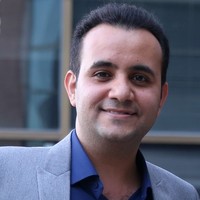Farzin Golzar new assistant professor in AI-Powered Renewable Energy Technologies
NEW DIGITALISATION RESEARCHERS
In November 2022, Farzin Golzar was appointed assistant professor in Transforming Energy Systems for a Sustainable Future through AI-Powered Renewable Energy Revolution at the Heat and Power Technology Division/Department of Energy Technology/ITM school.
Farzin Golzar, what are your research area, research interests, research methods, and application area?

My primary research area is focused on Transforming Energy Systems for a Sustainable Future through AI-Powered Renewable Energy Revolution. My interests lie in several key areas, including the application of Artificial Intelligence (AI) in modelling and optimising renewable energy resources, developing hybrid models using both Data-Driven Statistical Models and Process Driven Physical Models, conducting Comparative Life Cycle Impact Assessment (LCIA), and exploring various energy conversion and storage technologies.
I employ a range of innovative research methods, including the integration of Life Cycle Assessment (LCA) with techno-economic analysis of renewable energy technologies. I also utilise hybrid modelling approaches that combine both data-driven and physics-based models to address renewable energy challenges comprehensively.
What do you think are the large research challenges in your research area and why?
In the realm of integrating renewable energy resources into energy systems, several pressing research challenges emerge. These include seamlessly integrating intermittent sources like solar and wind with existing grids while ensuring stability, developing effective energy storage solutions to counter variability, and designing advanced control algorithms for optimal energy flow.
Additionally, concerns about cybersecurity, regulatory frameworks, and socio-economic acceptance play pivotal roles. Techno-economic viability assessments, environmental impact evaluations, and fostering interdisciplinary collaboration are also crucial. Technological innovation, scalability, and leveraging data analytics and AI further contribute to shaping a sustainable and resilient energy landscape. Addressing these challenges mandates a coordinated effort across disciplines, industries, and policymakers.
If you are looking for some research collaborator(s), what competence are you looking for?
I am seeking specialists in grid flexibility and network management. Additionally, I'm interested in professionals who can improve the robustness of the energy grid by enhancing contributions from distributed energy production and reducing reliance on external energy sources. Moreover, I aim to empower end-users by providing them with more control over energy services and contracts.
Finally, I'm looking for experts in developing user-friendly software based on the models created by our research groups to optimise the operation and management of distributed energy production. With this diverse team, we'll be well-equipped to tackle the multifaceted challenges outlined in my project's scope.
Can you tell us more about one of your research results and why you picked it?
One of the noteworthy research results I've been involved in pertains to the development of a turnkey solution for Swedish buildings, which involves the integration of photovoltaic (PV) electricity generation with energy storage systems (ESS).
This project is particularly significant due to the substantial impact cities have on global CO2 emissions, accounting for a significant 70 per cent share. By enhancing the energy performance of the built environment, we have the potential to make significant strides in reducing carbon footprints. The dynamic and dense nature of urban ecosystems presents a wealth of opportunities to advance climate targets.
Our focus on integrating solar PV with energy storage systems aligns with the broader goal of maximising renewable energy utilisation. This research combines a two-fold approach, encompassing detailed techno-economic scenario analyses to understand the implications of policy modifications alongside practical demonstrations of pivotal PV-ESS innovations at the cutting-edge facilities of KTH Live-In Labs.
This result was particularly compelling as it directly addresses the urgent need to revolutionise energy systems in urban environments and showcases a tangible pathway toward sustainable, low-carbon futures.
Lastly, what do you like with Sweden, Stockholm and KTH?
Sweden offers a unique blend of attributes that draw admiration. The country's natural beauty, characterised by picturesque lakes, dense forests, and captivating archipelagos, captivates many. Sweden's progressive values, exemplified by its commitment to social equality and forward-thinking policies, are commendable. Moreover, Sweden, especially Stockholm, stands out as a vibrant centre for innovation and technology in digitalisation, boasting a dynamic startup ecosystem and a reputation for cutting-edge research.
The capital city, Stockholm, is a cultural treasure trove, featuring world-class museums, galleries, theatres, and a thriving arts and music scene. KTH, the Royal Institute of Technology, shines as an institution of academic excellence, particularly renowned for its contributions to engineering and technology. The multicultural environment of both Stockholm and KTH creates a diverse and inclusive community that attracts individuals from all corners of the globe. Additionally, the dedication to sustainability in Sweden, encompassing initiatives in renewable energy, waste management, and urban planning, is both admirable and inspirational.
Farzin Golzar KTH profile
Farzin Golzar LinkedIn profile

